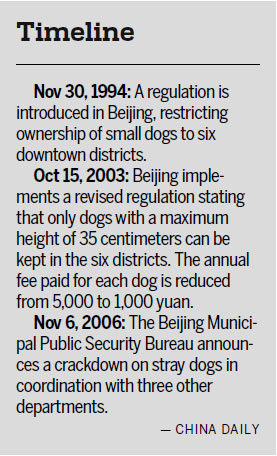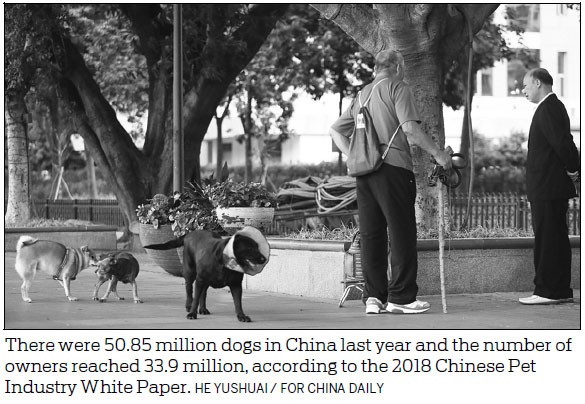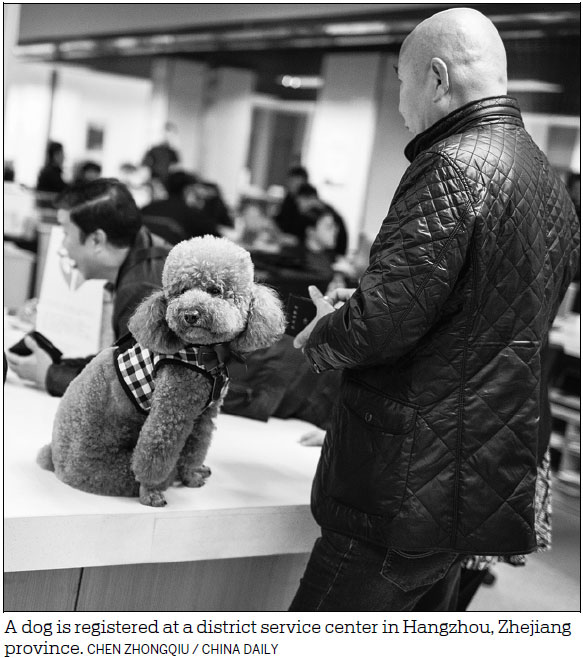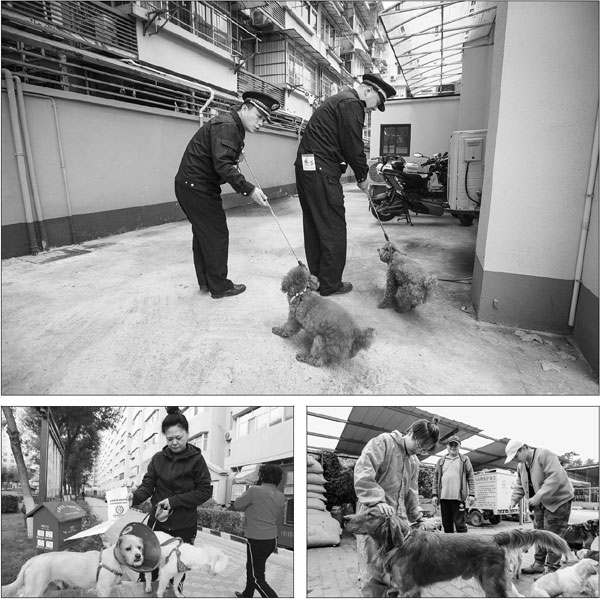Restrictions, criticism faced by dog owners
Questions raised over problematic animals being kept in large cities
Zhang Lei held back tears as she recalled the day early last year she brought Maomao, a small black mongrel, home from a truck full of strays standing by the roadside in Beijing.
The dogs were on their way to a pound between the Fifth and Sixth Ring Roads in Changping district in the north of the capital, where some strays are sent every week.
Zhang, 25, who was a university student at the time, loves to take care of stray dogs, especially those around her former college campus in Haidian district.
In recent years, the number of dogs in Beijing has risen rapidly, in line with the situation nationwide.
According to the 2018 Chinese Pet Industry White Paper, there were 50.85 million dogs in China last year and the number of owners reached 33.9 million.
However, the burgeoning canine population has raised questions over how owners in large cities can get along with people who don't have dogs.
Dog lovers have criticized strict local restrictions on the size of animals they can own and the hours during which they can be walked. Others have blamed savage dogs which, in some cases, have been responsible for fatal attacks.
Changing the rules
Since 1994, the regulations governing dog ownership in Beijing have been revised twice. Before that year, keeping the animals was strictly prohibited in the city.
Under a regulation introduced in November 1994, owners must register their dogs and have them immunized regularly against disease. The regulation also stated that they must pay an annual 5,000 yuan ($708) administrative fee.
Drafted by the Beijing Municipal People's Congress, the regulation is thought to have been the first of its kind in China relating to dog ownership.
In 2003, the administrative fee was reduced to 1,000 yuan a year under a revised version of the regulation that also stated that owners in the capital's downtown districts could only keep dogs with a maximum height of 35 centimeters. At peak times, owners should use elevators to avoid their dogs coming into contact with crowds. Dog excrement should also be cleared up immediately.
Owners who breach the regulation face fines of 50 to 500 yuan.
In 2013, there were strong calls in Beijing for the regulation to be loosened.
Shen Ruihong, secretary-general of the China Small Animal Protection Association, said: "Before 2003, the administrative fee of 5,000 yuan was too high. There are also many aspects of the current dog management rules that need to be improved."
The limit on the size of dog that can be kept should also be amended, he said.
"You usually can't tell the size mongrels will grow to in adulthood, and that's the reason the provision was brought in," he said.
"But with the passage of time, the ban no longer meets society's needs," Shen said, adding that some goodnatured larger dogs are suitable for owners living in communities.
Hidden dangers
The number of stray dogs in China has surged in tandem with urbanization.
In November 2017, a large blaze in Beijing's southern district of Daxing destroyed an apartment building, resulting in a least 19 deaths and dogs being abandoned on the streets. There were already a significant number of strays in the area.
Shen said that a special dog inspection center was set up in the capital in 1998 to shelter and manage strays, whose numbers have continued to grow in recent years.
The strays are also a major cause of rabies.
According to the Chinese Center for Disease Control and Prevention, 3,820 people died from rabies in China from 2013 to 2017. Last year, the disease caused 410 deaths in the country, second only to India.
Yao Yue, the Better Life for Dogs campaign manager at the World Animal Protection Association, said,"The high death toll from rabies is also closely linked to the fact that a large number of stray dogs have been mistreated, and the rabies vaccination rate is quite low.
"More important, as they strive for regulations to be relaxed, dog owners should ensure that they can care for their animals responsibly."
Yao said any problems caused by dogs are the responsibility of the owners and management departments. As long as there is an effective mechanism with serious punishment for breaches, owners "will learn their lessons and abide by the regulations".
In November last year, tough restrictions for dogs were introduced in Hangzhou, capital of Zhejiang province. The animals could only be walked from 7 am to 7 pm, with a fine of 5,000 to 10,000 yuan for errant owners. In addition, only 34 breeds can be kept as pets in the urban area, including Chihuahuas, Pomeranians and poodles.
Such restrictions have also been introduced in several other cities as part of a canine clampdown following a number of incidents.
In August last year, a Shanghai man was involved in a fatal fight with a resident in his community and her father after the daughter failed to keep her dog on a leash and it barked incessantly.
In September last year, a dog owner, whose animal was not on a leash, clashed with a woman in Hangzhou. The woman later gave birth prematurely, and police said the female owner had attacked her with the intention of causing injury.
Wang Jingbo, a law professor at the China University of Political Science and Law, said such incidents signify that enforcing the regulations remains a big problem.
Such attacks can happen on the spur of the moment; it can be hard to keep dogs under control in these situations; and the cost of law enforcement is quite high," Wang said.

Urban management law enforcement teams rarely track all dogs in cities to see whether the owners are abiding by the regulations, she said, adding that public awareness needs to be greatly improved.
Liu Xin, a professor at the School of Public Administration and Policy at Renmin University of China, agreed and said for people who don't have dogs, the pets pose a potential physical or psychological threat.
In interviews with Southern Weekly, a newspaper in Guangdong province, he said many dog owners live in cities, but the pace of urbanization has outpaced that to which they are accustomed. This has resulted in them thinking or living in "rural ways", where they seldom consider the feelings of others and are unwilling to exercise restraint," Liu said."These are the root causes of conflict."
Rising tensions have resulted in incidents of dogs being poisoned with isoniazid, an antibiotic used to treat tuberculosis. When dogs eat the tablets, which are sometimes placed in food, they may die.
Yao, the campaign manager, said killing dogs with poison will never solve the problem. On the contrary, it will encourage violence.
She suggested holding regular training sessions for dog owners, implanting dogs with electronic chips and imposing tough fines in cases where animals are abandoned.
Emotional comfort
Dog ownership in large cities has risen along with young people's disposable income.
Shen, from the China Small Animal Protection Association, said that as urbanization accelerates, the younger generation in big cities requires more emotional comfort from pets such as dogs. "This actually reflects some shortcomings in urban development, as many people now have to travel considerable distances to meet friends, as they have limited channels for emotional contact," he said.
Wang said dogs can also be good companions for elderly people in cities.
In October, research published in Circulation: Cardiovascular Quality and Outcomes, a journal in the United States, showed that dog owners may live longer, as canine companionship is closely connected with lower blood pressure and reduced stress. The research signified that this is particularly beneficial for those who have had heart attacks or serious cardiovascular problems.
However, Wang also said that a balance needs to be struck between dog owners and other members of the public.
"For the owners, it's more about social behavior, but constant adjustments and a balanced view are needed from both sides," she said.
"We should raise public awareness, enabling us to live together in a more harmonious society."
xinwen@chinadaily.com.cn
|
Top: Dogs are taken away by city management officers in Hangzhou, Zhejiang province. The animals will be returned when their owners register them. Chen Zhongqiu / For China Daily Left: A dog owner in Urumqi, Xinjiang Uygur autonomous region, cleans up after her animal.Provided To China Daily Right: A teenager works as a volunteer for an animal protection society in Xi’an, Shaanxi province. Provided To China Daily |


(China Daily Global 11/01/2019 page2)



















